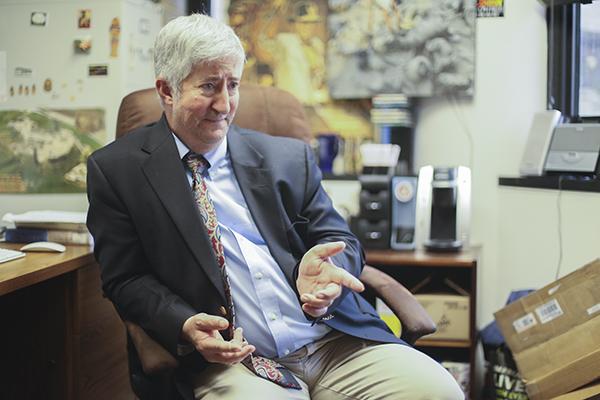Updated: March 5, 2015 at 3:31 p.m.
One GW professor hasn’t wasted any time uncovering history’s dirty little secrets: He’s started research for a new archaeological text while waiting to hear whether his most recent work will earn him a Pulitzer Prize.
Eric Cline, a classics and anthropology professor at GW, has penned 16 books, and is beginning a new one with his research on ancient civilizations. His class lectures and books often reinforce each other – that’s how he wrote “1177 B.C.: The Year Civilization Collapsed,” which might be his way to a Pulitzer Prize.
“Sometimes I’ll write something and try it out in a lecture, and it doesn’t quite work in the lecture,” Cline said. “So I fix the lecture and, as a result, I come back and I fix the book.”
“1177 B.C.” made Cline a Pulitzer nominee: His publisher, Princeton University Press, submitted an application for the book about a year ago to be considered for the prize. Winners will be announced next month.
Still, Cline said the award is not what is most important to him – it’s the writing.
“I like to tell stories,” Cline said. “Ancient history for me comes alive, and I like to share that with people.”
“1177 B.C.” has sold more than 36,000 copies and been translated into several languages, he said.
The book briefly sheds light on climate change, claiming that evidence began to appear in about 1200 B.C., Cline said. He had not expected critics to give the book high marks for those passages, but those parts turned out to be the most popular.
“I don’t pound the pavement with it, but there was climate change back then, guaranteed,” Cline said.
Cline’s next book looks at Megiddo, known as the biblical Armageddon.
Research on Megiddo has been underway for years, Cline said. Most published works about the site in modern-day Israel have been written for scholars and archaeologists, but he said he wants to write a book about what he’s seen for the general public.
Cline, a trained archaeologist and ancient historian, has been digging in Israel since 1994 and serves as the co-director of this dig. The new book, called “Digging up Armageddon,” will be divided into three parts: the history of the site, the archaeologists’ stories and Megiddo “in the context of Western civilization,” he said.
Cline said archaeologists have discovered 20 cities stacked on top of each other in Megiddo that were built between 3000 and 300 B.C., and that’s how he will start the book. It will be released some time after the manuscript is due to the publisher in June 2016, he said.
Cline and his wife, Diane, who is an associate professor in the history department, often bring students along to historical sites to teach them about ancient epochs with context that is still standing.
Evan DeFrancesco, a junior majoring in classical studies, went to Greece on a trip that Cline’s wife organized last spring as a part of her Dean’s Scholars in Globalization course on Alexander the Great. Cline accompanied his wife and the students to teach them about the Bronze Age in Greece, a time period included in “1177 B.C.”
DeFrancesco, who has read a couple of Cline’s books, said their scope can appeal to a wide audience.
“What really comes through is that he’s writing a scholarly work but he has a more general audience in mind,” DeFrancesco said. “[It] speaks to his objective of trying to make classical archeology accessible to a wider variety of people.”
Greg Hughes, a history major who graduated in December, said he has taken trips to both Megiddo and all around Greece with Cline and his wife. He also said that the journeys have shown that Cline has a way of making history accessible to those who are not ordinarily drawn to the subject.
“Everyone secretly is interested in history,” Hughes said. “It just has to be taught in the right way.”
Ellie Smith contributed reporting.







